by Rafaël Newman
Love is as strong as death, but no stronger.
The NewMen, “Uncle Leo”
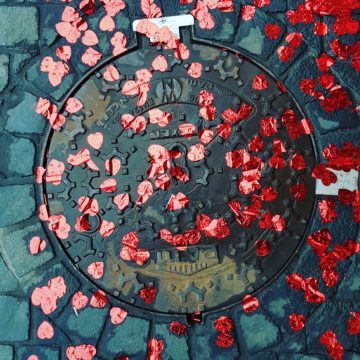 On Saturday, April 10, 2021, in Fribourg in the west of Switzerland, Besuch der Lieder, the troupe of musicians with whom I serve as a dramaturge, staged its first performance after a hiatus of more than a year: for once, however, not, as our concept dictates, an in-house song recital in the fashion of the nineteenth century, but rather, COVID oblige, a live stream via YouTube. Annina Haug, mezzo-soprano, and Edward Rushton, piano, performed Lieder by Schumann and Strauss and mélodies by Fauré and Saint-Saëns; I commented on our choice of songs. What follows is our programme, with links to the texts sung in their original languages, interspersed with an adapted version of my remarks (given on the occasion, in honor of the bilingual character of the host canton, in German and French, as well as in English; translations of poems below are mine). The recital itself can still be “attended” here.
On Saturday, April 10, 2021, in Fribourg in the west of Switzerland, Besuch der Lieder, the troupe of musicians with whom I serve as a dramaturge, staged its first performance after a hiatus of more than a year: for once, however, not, as our concept dictates, an in-house song recital in the fashion of the nineteenth century, but rather, COVID oblige, a live stream via YouTube. Annina Haug, mezzo-soprano, and Edward Rushton, piano, performed Lieder by Schumann and Strauss and mélodies by Fauré and Saint-Saëns; I commented on our choice of songs. What follows is our programme, with links to the texts sung in their original languages, interspersed with an adapted version of my remarks (given on the occasion, in honor of the bilingual character of the host canton, in German and French, as well as in English; translations of poems below are mine). The recital itself can still be “attended” here.
*
Gabriel Fauré (1845-1924)
La chanson d’Ève, “Paradis”
A world is dawning, new, and,
Like a flower, night’s dazed exhalation,
On the fresh breath rising off the ocean
A garden blossoms, blue.
All is confusion still, a mass of things,
Of singing birds and rustling trees,
Of whirring wings,
And crashing springs, of water and of chanting breeze,
A giant noise
And yet: no single voice.
But now, aroused by God, divine and sweet
Young Eve awakes; her dazzled gaze
Upon the dreaming world before her feet,
She greets the very first of all our days.
Now God commands her: “Go, my child,
Grant from your lips a tone
To every being in my new-created wild:
A name, that by their maker they are known.”
And Eve emerged, obedient to her lord,
From out her bower of rose,
And granted all that grows
And flourishes, from flowering lips, a word:
That everything that creeps, and breathes, and soars – be heard…
Meanwhile the day is waning, dim, in twilight
As at dawn: and slowly, bound for bed,
The garden, silent, greets the growing night
And sheds its robe, and lays its dreaming head.
The voice is stilled, and yet the world still harkens;
There is a hush among all things,
As, with the star that rises when the heavens darken,
Eve sings.
Eve sings, in Gabriel Fauré’s setting of the Genesis story as re-imagined by Charles van Lerberghe. Born out of God, herself divine, the world at her feet like a beautiful dream, van Lerberghe’s Eve is immediately ready to serve her Lord, who gives her the task assigned by the conventional narrative to Adam (for the first man is notably absent from this version): it is Eve’s duty now to give voice to creation. And all of the earth’s creatures duly listen, enraptured, as Eve sings their initial chaos into order, into knowledge: but not, in this retelling, into the knowledge of good and evil; rather, Eve sings into being a signifying relationship with the world suffused by love – “How brilliant is my God today”, she will admire her maker later in the cycle, “How splendid is he in the light / Shed by our love, my stripling god!”
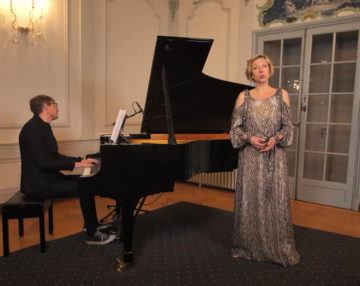 Eve’s is a love for all things – including death. “Death to which my soul aspires,” she will declare in her final song: “Gallant god, whom I await / With song, with laughter, and with love.” This is not, however, Keats’s suicidal melancholic, “half in love with easeful death,” to whom it “seems … rich to die, / … / While thou art pouring forth thy soul abroad / In such an ecstasy!” – the romantic poet’s prayer to a nightingale, one of Eve’s earthly creatures. In van Lerberghe’s cycle, Death, la mort, has a voice of its own, a song issued from the natural round of which Eve is herself a part and to which she aims to return, in a lyrical movement that recognizes death as part of life, rather than as the cure for life’s pain.
Eve’s is a love for all things – including death. “Death to which my soul aspires,” she will declare in her final song: “Gallant god, whom I await / With song, with laughter, and with love.” This is not, however, Keats’s suicidal melancholic, “half in love with easeful death,” to whom it “seems … rich to die, / … / While thou art pouring forth thy soul abroad / In such an ecstasy!” – the romantic poet’s prayer to a nightingale, one of Eve’s earthly creatures. In van Lerberghe’s cycle, Death, la mort, has a voice of its own, a song issued from the natural round of which Eve is herself a part and to which she aims to return, in a lyrical movement that recognizes death as part of life, rather than as the cure for life’s pain.
L’Amour à Mort: an all-encompassing love, a love so immense that it includes even death in its embrace; a love that is prepared to accept death as the price – indeed, as the culmination – of life; death as an inevitable component of life, which is in its turn the non-negotiable precondition of human happiness. Since, after all, no life is without pain; yet there can also be no joy without life.
But let us descend from the celestial pleasure garden to the labyrinths of the terrestrial sphere. For alas, a love of this kind was not accorded our next queen, an earthly sovereign who would surely have been all too happy to pledge her love to her husband “till death us do part,” but who instead was condemned to suffer for decades, solitary, “in cruel imprisonment,” and who was to die alone. Mary Stuart, Queen of Scots, whose own verses were set in German translation by Robert Schumann, was obliged to learn that a celibate monarch could not fulfil her primary duty, which was to provide the kingdom with an heir; but that a married queen would be compelled to cede her power to her husband. Such a monarch very likely would, in the end, devote herself to death: for only in its embrace could she escape her country’s imbroglios – and those of her family.
Robert Schumann (1810-1856)
Fünf Gedichte der Königin Maria Stuart
Adieu, my own belovèd France!
Where I had found a homeland dear,
Thou nursemaid of my childhood years:
Hence am I bound from thee now, hence!
Adieu, my land, my better days,
The boat bears me from joy away!
And yet it bears but half of me:
A part of me is ever thine;
My happy land, it bids of thee,
Recall the rest, across the brine!
So might she have sung, the daughter of Marie de Guise, as she embarked on her return to Scotland in 1542. In French, of course – what you see above is my rendering of the German version of Mary’s verse by Gisbert Freiherr von Vincke, used by Robert Schumann as the text for his song cycle. So many translations, so much treachery!
Mary Queen of Scots is in a mournful mood on her departure, although she is bound for her fatherland, her throne, and her crown – because she has had to give up her belovèd France to regain them, and it is in France that she has left her heart; while in Scotland – or rather, in England – she will find only death.
We are more fortunate today. We may not be queens, but it is precisely by virtue of that status that we enjoy a certain liberty, as much in our art as in our loves. Let us return, then, to France; and let us love again, for the duration of a song. Or three.
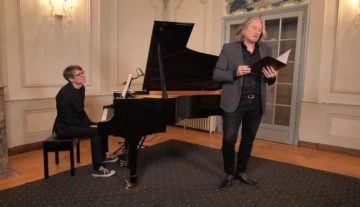 Our next series of mélodies, by Camille Saint-Saëns, begins and ends with the composer’s setting of amatory odes by Victor Hugo, grouped around the “Danse macabre”, a grotesque and ribald evocation of love beyond the tomb set to a text by Henri Cazalis. In the first of the two Hugo poems we find the poet, that giant of 19th-century French letters, in torch-song mode, all too aware of the finite nature of earthly love, lamenting the allures of an unobtainable paramour with the soul of a modern pop star. Think Ani Difranco, or Joan Armatrading: Why do you come here, when you know I have troubles enough? (And indeed, Françoise Hardy, the darling of the yé-yé generation in France, recorded her own, feminized version of Hugo’s text, complaining of a love as irresistible as it is forbidden.) Hugo’s frustrated lover asks a series of angrily ironic, rhetorical questions – “If there’s nought you need to tell me / Why are you here by my side? … Why do you insist on coming / If my sight you can’t abide?” – interspersed with declarations of desperate longing worthy of Sappho: “When you smile, the king’s enamored … When I saw you first, I stammered.”
Our next series of mélodies, by Camille Saint-Saëns, begins and ends with the composer’s setting of amatory odes by Victor Hugo, grouped around the “Danse macabre”, a grotesque and ribald evocation of love beyond the tomb set to a text by Henri Cazalis. In the first of the two Hugo poems we find the poet, that giant of 19th-century French letters, in torch-song mode, all too aware of the finite nature of earthly love, lamenting the allures of an unobtainable paramour with the soul of a modern pop star. Think Ani Difranco, or Joan Armatrading: Why do you come here, when you know I have troubles enough? (And indeed, Françoise Hardy, the darling of the yé-yé generation in France, recorded her own, feminized version of Hugo’s text, complaining of a love as irresistible as it is forbidden.) Hugo’s frustrated lover asks a series of angrily ironic, rhetorical questions – “If there’s nought you need to tell me / Why are you here by my side? … Why do you insist on coming / If my sight you can’t abide?” – interspersed with declarations of desperate longing worthy of Sappho: “When you smile, the king’s enamored … When I saw you first, I stammered.”
Camille Saint-Saëns (1835-1921)
“Si vous n’avez rien à me dire”
“Danse macabre”
“Rêverie”
Since every soul that tarries here
Its music grants another,
Its flame and perfume, as the rose
A thorn gifts to its lover;
As breezes grant the branch a bird,
As dawn the flower its dew,
As brackish brooks the bank embrace,
So come I now to you:
And bending o’er you bid you take
The best I can deliver:
My mournful thoughts, refreshed with tears
As by an endless river.
My vows accept, all numberless,
The flame of youth, the shade
That comes with age, my tenderness,
And every song I’ve made!
My spirit errs uncaptained forth
And has no star above;
Take then my very deathless self,
My heart, which is but love!
From the eros of Hugo’s sublunary lovers, in our final group of songs, settings by Richard Strauss, we move to the agapé that is expressed in the more generalized love of the family, the friend, the natural, the divine – and thus return to the love conjured up by Eve in her song of creation. “I bend above your sleeping head”, writes Gustav Falke, in “To my child”,
And bless you gently in your bed.
Each tender breath you draw is like
A comet erring through the night,
A questing mission near and far
To find a little precious star
Whose body, made of merest shine
Affords our love a medicine,
That she might wing to us below
And lay it on your sheets of snow.
A child lies in bed, the vessel of its parent’s love and care, while its soul in dreams goes in search of a remedy to the malady that plagues us all, that has every parent, every lover trembling: death, and the end of our love.
And yet, the sleeper will surely awaken, as does Eve in the Garden of Eden. And realize that she has borne with her from her dreams the best part of them: hope. And though it may be a hope for peace beyond the troubles of this world, in a mysterious white cottage in the green sward among brilliantly painted idols, where the lovers are received in the “Friendly vision” of Otto Julius Birnbaum, who dreams with his eyes open, like Hugo – yet it is a hope that sustains us.
Richard Strauss (1864-1949)
“Meinem Kinde”
“Freundliche Vision”
“Morgen”
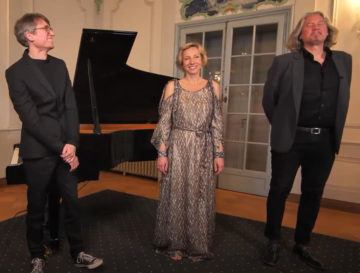 We end with “Morgen”, the vision of John Henry Mackay, a pioneering Scottish-German anarchist and campaigner for homosexual rights: his vision of a future of harmony, solidarity, tolerance, and grace:
We end with “Morgen”, the vision of John Henry Mackay, a pioneering Scottish-German anarchist and campaigner for homosexual rights: his vision of a future of harmony, solidarity, tolerance, and grace:
The sun will show itself again tomorrow.
It will unite us once again as one,
Upon my lonely path today; tomorrow
We’ll walk together happy, in the sun…
And we will stroll, united, to the strand,
Down where the waves roll azure to the shore,
In silence seek each other’s notice and
Let happiness descend on us once more…
*
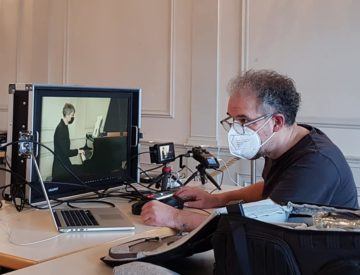 Besuch der Lieder thanks Laurent Wassmer, for his careful and creative camera work; the Paroisse de St-Nicolas in Fribourg, for the use of their cherub-decked salon; and Caroline und Pierre Corboz, for the gracious loan of their grand piano.
Besuch der Lieder thanks Laurent Wassmer, for his careful and creative camera work; the Paroisse de St-Nicolas in Fribourg, for the use of their cherub-decked salon; and Caroline und Pierre Corboz, for the gracious loan of their grand piano.
www.anninahaug.com
www.edwardrushton.net
www.besuchderlieder.net
